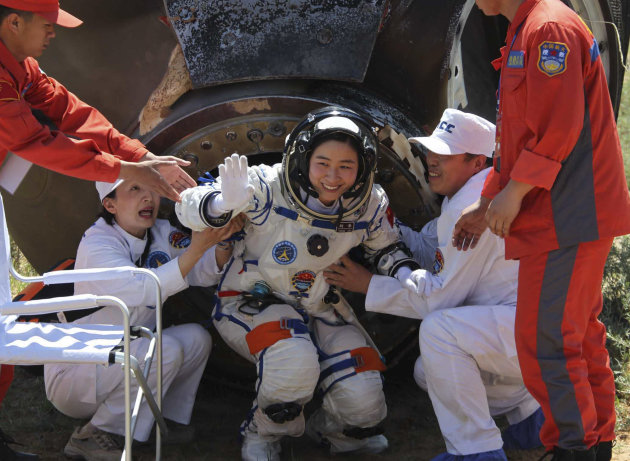
On Sunday, China's Shenzhou-9 spacecraft successfully docked with the orbiting Tiangong-1 space lab, heralding the Asian superpower's arrival as a technological leader in the space race. China is now one of three countries, including the U.S. and Russia, to pull off such a feat, and Beijing's mission also marks the first time that China has sent a female astronaut into space. The docking caps phase two of the country's 30-year, three-phase plan to build an expansive, fully operational space station to rival NASA's Skylab, which orbited Earth from 1973 to 1979. And with China's space-age ascendance sharply contrasting with the United States' increasing reliance on private entities like SpaceX to carry out routine missions, will China's presence among the stars soon surpass America's?
Not in the near future: China's space program still has a long way to go to catch up with the U.S. and Russia, says Joan Johnson Freese at CNN. China's development has been slow and steady, while NASA advanced very quickly during the Apollo phase in the '70s — a veritable "tortoise and hare" comparison. Despite China's incremental progress, America still benefits from its decades-long headstart. Plus, China's ambitions "do not come with an unlimited budget," and the U.S. government's decision to lean increasingly on the private sector for its "low-Earth orbit needs" means NASA "can focus its limited budget on new, more distant exploration goals."
China is merely trying to keep pace: China's aim isn't to race past the U.S., but rather to avoid "falling too far behind," says N. Gopal Raj at India's The Hindu. Beijing's planned space station finds its origins in the Chinese government's "Plan 863," a 1986 scheme to "close the gap with advanced nations in chosen areas of science and technology." Obviously, a Chinese space station is decidedly less ambitious than U.S. dreams of a mission to Mars, or even a short trip to the moon. Clearly, China is in no hurry.
But the U.S. is losing out on a real opportunity: Congress forbids NASA from working with China cooperatively — and that's a shame, astronomer Jonathan McDowell tells NPR. While it "does make sense for the United States to be protective of some of its advanced technology," we should still work with the Chinese. The blanket ban "goes against the scientists' natural tendency to want to talk to each other in this very international and globalized world." It's easy to make Americans "afraid of China" as "both a national security competitor and an economic competitor," but I think "the more we communicate, the less the tensions will be." The current stand-off is bewildering. Retweet this story
No comments:
Post a Comment